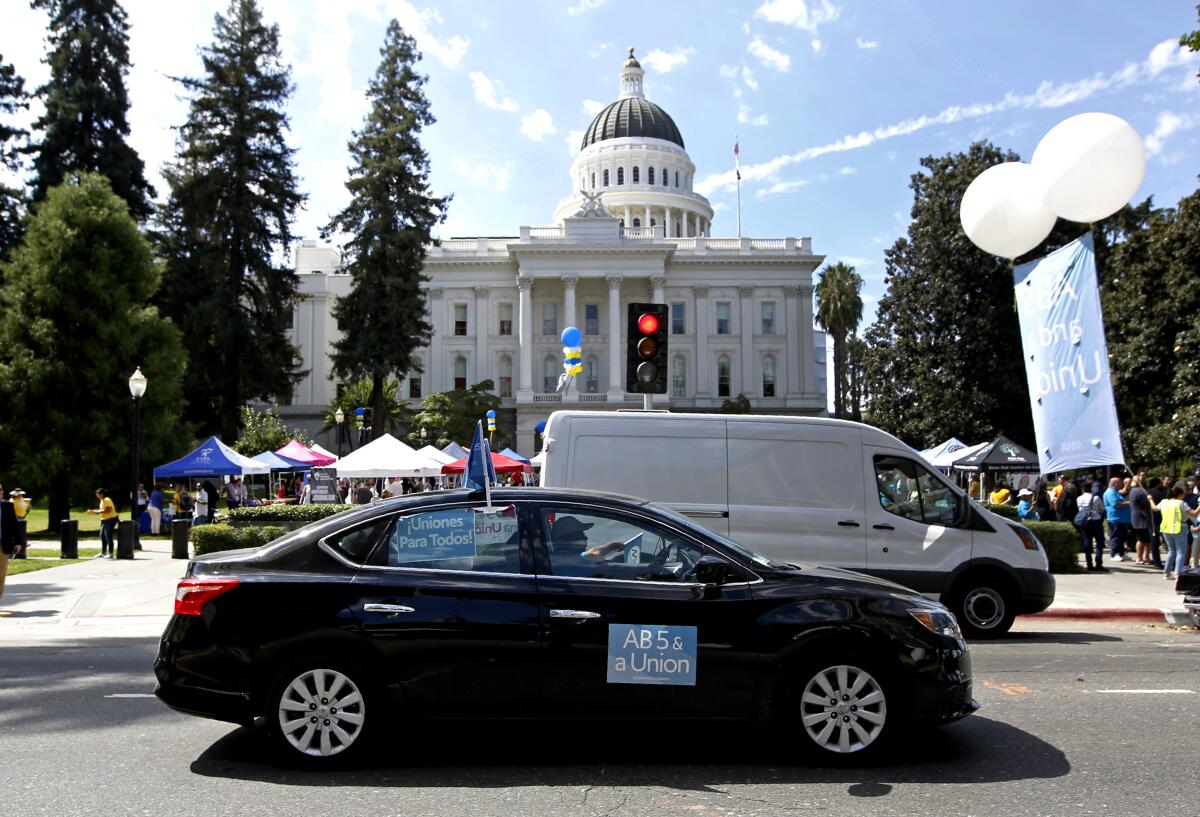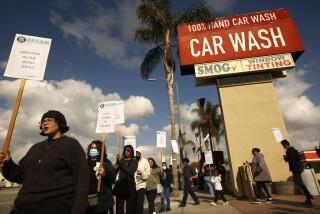California’s employment law was rewritten. Many independent contractors aren’t thrilled

State Capitol Democrats and organized labor say their new “gig” law will correct the misclassification of 1 million California workers who are falsely deemed independent contractors. But their thinking reflects a misunderstanding.
Or maybe it’s just an ignoring of reality to rope in more dues-paying union members. If these workers are reclassified under the law as someone’s employees, they’ll be eligible to join a union.
The apparent misunderstanding is about the nature of work for many people in the 21st century.
The gig law’s advocates, including Gov. Gavin Newsom, are treating the 1 million independent contractors as if they’re steelworkers or coal miners — or field hands weeding tomatoes with short-handled hoes under a boiling sun.
At any rate, they’re all being exploited by greedy, heartless corporations, according to the law’s supporters.
Sure, some ride-share drivers for Uber and Lyft are getting a bum deal. Some I’ve talked to believe that. Others like their gigs just fine, savoring the flexibility to choose when they drive.
There are tens of thousands of independent contractors who apparently don’t feel the slightest bit exploited. And they don’t want anything to do with formal employment or unions. They include healthcare workers, psych therapists, budding musicians and truck drivers who own their own rigs.
To back up, the legislation, AB 5, enshrines in state law a California Supreme Court decision that significantly tightened the rules for classifying a worker as an independent contractor rather than an employee. An employee is eligible for benefits and pay guarantees, plus union membership, but also is subject to the employer’s dictates.
The court established a complex “ABC” test. To avoid being considered an employee, a worker must: A. Be free of the hirer’s control; B. Do work that is “outside the usual course of the hiring entity’s business”; and C. Be established in a trade similar to the work being performed.
A worker must satisfy all three criteria. And it’s “B” that has independent contractors worried.
The legislation, by a former labor organizer, Assemblywoman Lorena Gonzalez (D-San Diego), seemed to be aimed primarily at Uber and Lyft. But many professionals earning good money were affected, too.
Newsom signed the bill last week without inviting in reporters, avoiding pesky questions about why some workers gained exemptions and others did not.
Those exempted included doctors, lawyers and insurance brokers. Some healthcare workers, musicians and independent truckers were among those who weren’t.
“A problem with AB 5 is some people got exemptions because they had political juice and other people didn’t,” says labor lawyer Brad Shafer. “This is a legal standard that forces people who want to be independent contractors to be classified as employees…
“Take any performer who comes on stage at Staples Center. That entertainer would arguably be an employee of Staples Center. The performer is providing entertainment, and that is the business of Staples Center.”
Richard Burgess, who heads the American Assn. of Independent Music, says, “this could have a big impact on the California recording industry. Already, we’re hearing labels say, ‘Oh, well, we’re not going to do anything in California anymore.’ They don’t want to be working where costs go through the roof.”
Jordan Bromley, a Los Angeles lawyer who represents a new organization called the Music Artists Coalition, says the law “paints with too broad a brush.”
“For example, a young artist is recording in her basement. If she invites her next-door neighbor over to play guitar on the record, under this law she’s an employer. And all the obligations of being an employer fall on her.
“This law is going to hurt a lot of budding musicians trying to make it. It’s so hard to make it in our business as it is. This may be the final straw.”
Pasadena physical therapist Dawn James hardly feels exploited as an independent contractor.
“AB 5 was written to protect workers,” she says. “As a professional with two doctorate degrees, I really don’t believe it was meant to include me.”
James contracts with school districts to help children in special education. And she serves adults with developmental disabilities at regional centers.
“This is going to be a huge disruption for the children I serve,” she says. “I will not become an employee. I like having my own hours.”
Assistant professor Jeffrey Darna directs the USC Program of Nurse Anesthesia. He also contracts out as an anesthesiologist. If Darna were a physician anesthesiologist, he would be exempt from the new law. But he’s a nurse, so he’s not.
What’s the difference?
“We [nurses] cost the system less, but deliver the same level of service,” he says. “We can work with patients who are on Medi-Cal. And we are the only anesthesiologists in nine Northern California rural counties.
“Access to rural healthcare is at risk now because of this law.”
Alison Salter of Pasadena has been a clinical counselor and dance movement therapist for 30 years, after she was laid off three times from unstable hospital jobs. She works in Orange County with clients who have experienced physical or sexual trauma.
“This wipes out my business model,” she says. “I subcontract other therapists. And under AB 5, I’ll have to make these people employees. I don’t know whether that’s feasible.
“Unfortunately, a small number of little people are being affected that a lot of legislators really don’t know about.”
All these little people will be pressing for exemptions when the Legislature reconvenes in January. They should.
But the entire law should be rewritten with more realistic definitions of “independent contractor” and “employee.” Democrats and labor overreached.
More to Read
Start your day right
Sign up for Essential California for news, features and recommendations from the L.A. Times and beyond in your inbox six days a week.
You may occasionally receive promotional content from the Los Angeles Times.







